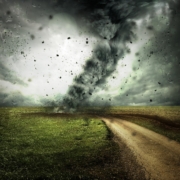Shitstorm travels to Germany
Article by John Morrish
Words travel, and sometimes in surprising ways. An English slang term has been enthusiastically adopted by the Germans. It has been embraced by the business and political classes, appeared in big headlines in the serious press, and been accepted by the Duden dictionary, an important work of reference. Angela Merkel has been known to use it. Nothing so unusual in any of that, except that the word is “shitstorm”.
You don’t need me to tell you that “shit” is a taboo word, the shock-value of which has varied over the years. Indo-European in origin, and liberally spread around the Germanic languages, it is can be either verb or noun. It means, of course, dung, ordure, excrement. In the unhygienic Middle Ages it seems not to have shocked anyone very much: there were place-names incorporating it. By Tudor times it had become offensive enough for controversialists like Thomas More to employ it with gusto.
More genteel eras didn’t like it, at least not in public. Inevitably, those working on taboo words in the Oxford English Dictionary had to trawl through more racy fare than their colleagues; thus quite a lot of its citations for “shit” are from the under-the-counter literature of the 18th and 19th centuries. There it usually had its literal meaning. It also became a name for a man you didn’t like; rather a posh usage, I always think, employed by men in dinner jackets and prefixed by “frightful”. Thereafter it started to mean anything worthless or unpleasant. Then, particularly in the US, the sluice-gates opened, providing us with numerous cheerful shit-related idioms and compounds, expressing all sorts of contempt, disgust and indifference. The rest of the English-speaking world chimed in, even little New Zealand, which gave us “to put the shits up someone”, meaning to scare them.
Shitstorm is American, first recorded as “shit storm” in Ken Kesey’s 1962 novel One Flew Over The Cuckoo’s Nest, where it meant something like “commotion”. More recently, it has occasionally been used to describe a shower of abusive comment heaped upon someone on the internet and so-called social media. It is in that sense that it has been adopted by the Germans. During a phone-in in Heidelberg, Chancellor Merkel was asked whether there should be a “driving licence” for the Internet. Yes, she said, but she wasn’t making policy there and then. “Sonst haben wir morgen einen Shitstorm zu gewärtigen,” she said: “Or we can expect there to be a shitstorm tomorrow.”
The Germans like the word because they have no precise equivalent for it and because English (American, more accurately) is seen both as “cool” and as the language of the online world: Duden also finds room for the verb twittern, to tweet. They are unconcerned about its offensiveness and low origins. They have a lot of scatological swearwords of their own, of course. Indeed, many people have theorised about the Germans’ alleged obsession with their own bowels.
Scholars, however, take a different view. It is not that the Germans are obsessed; they favour excremental swearwords because they are exceptionally reluctant to use sexual terms in cursing and abuse. Where English-speakers reach for the f-word, Germans employ variants on Scheiße. Consequently, Scheiße is a very strong word. They would not put Scheißsturm in their headlines, though it means exactly the same thing as shitstorm. The English word is altogether less troublesome, because its literal meaning is safely remote.
Shitstorm is already in the OED, of course, but it is not exactly acceptable in formal use, nor likely to be. On the other hand, it is useful and vivid slang. Like an Anglo-Saxon “kenning”, it is two Germanic words yoked together to make one image. You can see it in your mind’s eye, just like a whale-road (the sea), or a sky-candle (the sun). Shakespeare would approve (though he did not use “shit”), but perhaps not Dr Bowdler.
The Germans also have “Candystorm”, an English-derived word for the opposite phenomenon, when people on the internet are showered with praise and goodwill. We don’t have it, possibly because it doesn’t happen.





